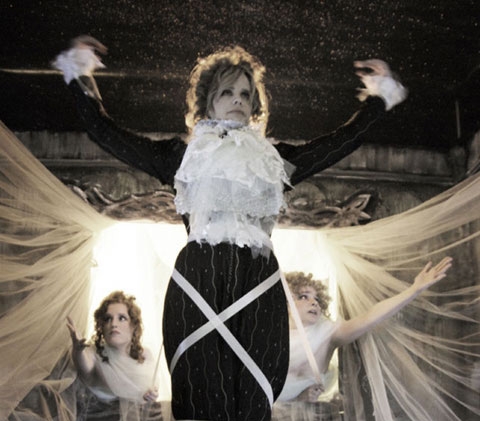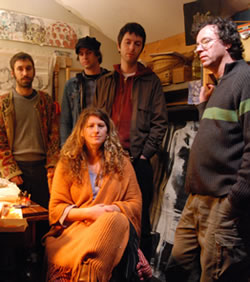This limited-edition CD was my introduction to Ms. Melora Creager, and what an introduction it turned out to be . The resonant feeling I heard on the first playing sent me off on a web-surfing frenzy that ended with my debit card lying on the corner of my desk feeling violated, and several virtual shopping carts loaded with Rasputina discs on my laptop screen. I’m a willing sucker for pensive, sappy music, and Creager offers that in spades here.
Turns out ‘Melora a la Basilica’ is the pinnacle though, at least for the time being. Creager seems to have found that sweet spot that lies precariously just beyond artistic experimentation and onto the frontier of profound. In pouring through the Rasputina catalog leading up to this solo recording one can clearly hear the slow maturation of sound that culminates in an abandoned warehouse whose walls provide the perfect acoustics for these stripped-down offerings from Creager and second-chair Daniel DeJesus. The two of them leverage the incredible power of the cello to render any ordinary listener into an involuntarily weeping heap of rubble, and the combination exacerbates the experience by doubling the cellos and adding her intoxicatingly strong and emotive vocals to boot. The result is thirty-eight minutes of acoustic and vocal bliss that will either leave you drained or invigorated, and probably both.
All the more amazing considering there is literally nothing new here. Every track on the album is either a cover tune, a remade Creager original from her Rasputina days, or both. Creager appears to have a longstanding talent for making other people’s music her own through innovative covers, but here the lines between original and cover are blurred beyond recognition, and she breathes new and melancholy life into her own songs which benefit from more starkly mature arrangements and outstanding sonic qualities. Honestly, it took me almost three playings before it dawned on me that the opening “Clowns” is actually a cover of the more-famous Goldfrapp original, made here into a poignantly glum character sketch courtesy of her controlled wailing and purposeful string-bowing. The resonating strings barely fall silent before she rips into an inspired rendition of Tom Petty’s “American Girl” that captures, possibly for the first time, that song’ true meaning of a forlorn teen on the brink of suicide.
Other must-hear tracks include an absolutely heartbreaking offering of “Rose K.”, a terribly personal picture of age and decline: “…oh I don’t know why they have taken all my favorite things away; but one thing’s for sure, I don’t know what they were…”; “Rusty the Skatemaker” in which Creager sounds like a mad female cellist channeling Colin Meloy’s muse; and an a cappella rendition of the Eddie Vedder crowd-pleaser “Soon Forget”.
DeJesus’s high tenor vocals and anchoring cello accompaniment quietly complement Creager beautifully throughout, but he projects mightily on “Green Finch/Johanna” from the tragic Sondheim musical Sweeney Todd, yet another cover that demonstrates Creager’s appreciable talent for making thematic connections between songs that on the surface seem to have nothing in common.
I could go on, but considering this is an individually-numbered, 1,000 copy limited-edition in a collectable tin case, you might miss out by delaying any longer in picking it. So go buy the thing now; my copy is number 986 so time is running out. Very highly recommended to dreamers, left-leaning naïve optimists and drama-club geeks.
peace




